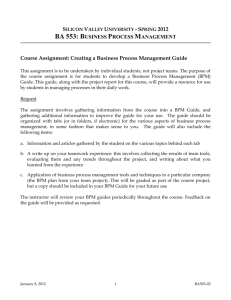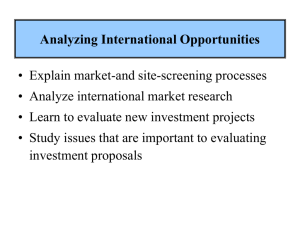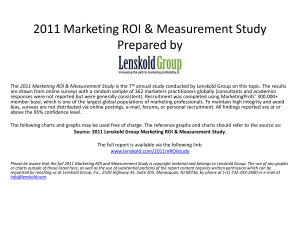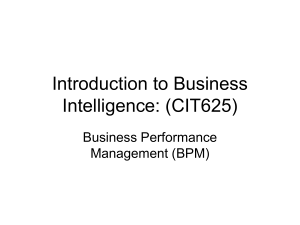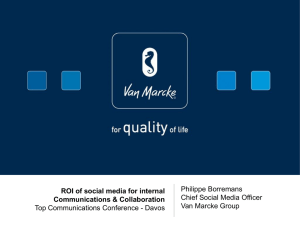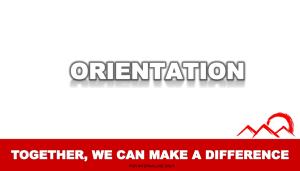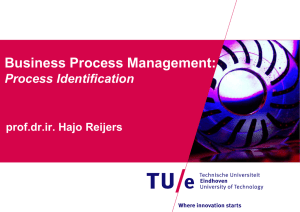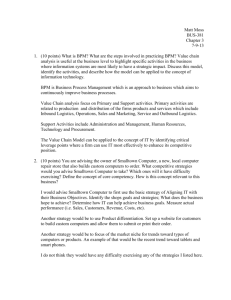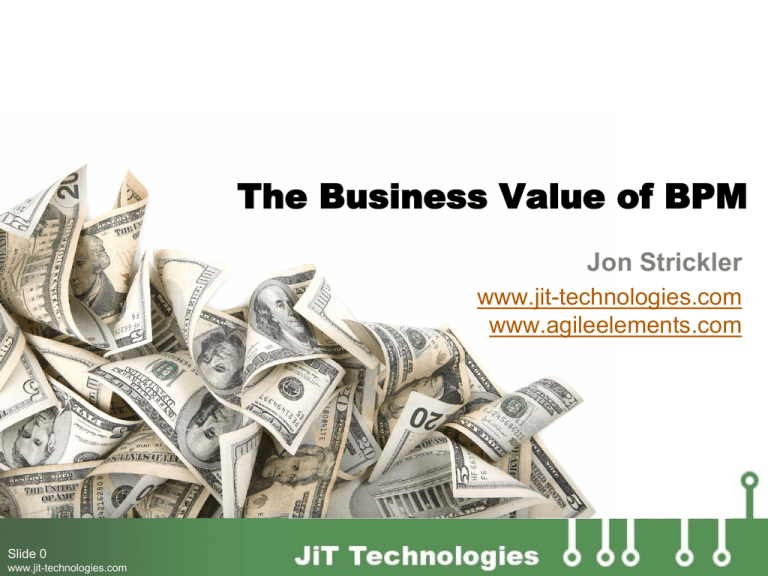
The Business Value of BPM
Jon Strickler
www.jit-technologies.com
www.agileelements.com
Slide 0
www.jit-technologies.com
Session Objectives
A BPM Case Study
A Model for ROI Quantification
ABPMP: Assoc of BPM Professionals
The Future of BPM
Slide 1
www.jit-technologies.com
The Business Value of BPM
A BPM CASE STUDY
Slide 2
www.jit-technologies.com
EXECUTIVE SUMMARY
Slide 3
www.jit-technologies.com
We analyzed <Company Name>’s bank
card claim processing
Includes
• ATM and Debit
• Fraud and Dispute
Excludes
• Claims Intake Center (CIC)
52 processors work 18,000 claim transactions/mo worth $1.8M
Governed by Regulation E which dictates standards
and maximum cycle time for claims
Slide 4
www.jit-technologies.com
• ATM and Debit Creidt Claims - 52 processors work 18,000 claim
transactions/mo worth $1.8M
• Become 100% Reg E Compliant
Validation of Problem
• Gain Efficiencies – Reduce Work In Progress, Cycle Time, Touch Time
• Reduce Costs: Reduce Write-offs, Charge Backs, and Mitigation Rate
Visualization
of Solution
Justification of
Project
• 770% ROI projections
• 3 year NPV of $4.5M
• Improving efficiency from 25% to 55% will save $875k each year
We found the process to be manual, inefficient and
paper intensive
Manual work assignment using tally sheet
Tracking and reporting on process is through
manually generated reports
11 different systems require duplicate keying and
multiple look-ups
New paper is created to document research,
communicate charge backs and write to customers
Approximately 6,000 sheets of paper printed by
the team each day
Our Solution Approach simplifies
process and increases efficiency
Automated work assignment
Real-time, automated reporting and
performance dashboards
INTEGRATED USER EXPERIENCE
Integration used to reduce or eliminate
re-keying of data, and the need to work
within multiple systems
Automated capture and attachment of
research evidence and correspondence
CORRESPON
-DENCE
MGMT
Implementation process improvements
including straight-through processing
for claims under $20
BPM architecture enables numerous
improvements in user experience and
process
Manager / Supervisor
BPMS
Processor
Exec / VP
Single User Interface for Each Persona
Real-Time
Reporting
Dashboards
Automated
Work
Allocation
Workflow &
Process
Orchestration
Automated
Calculation of
Provisional
Credit
Letter
Generation
Document
Management
Enterprise
Systems
Web Services Integration Layer
General Ledger
Letter Macro
Mail Merge
General Ledger
FTBS
Falcon
MPS
Fidelity
Safe
Issuer Direct
Acquire
Navco
Imagesoft
Improving Card fraud process using BPM will
result in a Net Present Value of $4.5M
In less than 6 months the solution will have paid for itself
The solution has an ROI of over 770%
5 Year Cash Flow
Slide 9
www.jit-technologies.com
APPROACH
Slide 10
www.jit-technologies.com
viewPoint Assessment Approach
Approximately 10-20 Days
Approximately 10-20 Days
Problem
Definition
User-centric
Discovery
Solution
Proposal
Analysis
Stakeholders agree
upon goals and
success criteria
Observe and interview
participants in work
environment
Tailor a solution to
your unique needs
Agree to
recommendations and
improvement potential
•
Whiteboard highlevel process
•
Gather current
process metrics
•
Map improvements
to goals
•
Review proposal
with stakeholders
•
Discuss pain points
•
•
Identify process
participants
Design improved
process
•
•
Observe process
participants doing
work
Understand process
improvements
•
Mock-up key user
experience roles
•
Present user
interface mockups
•
Calculate and
validate estimates
•
Refine projected
return on investment
•
Prioritize goals
•
Gather artifacts
•
Identify metrics
•
Identify opportunities
for improvement
Slide 11
www.jit-technologies.com
Our solution addresses key goals
Pri
As-Is Situation
Near Term
Proposed Solutions
Goals Met
1
Workflow/Navigation of forms can be
improved
See Proposed Solution
Regulatory Compliance
Efficiency
1
Paper Screen Capture – Research that is being
performed in the various mainframe systems
is being printed, bar-coded and scanned back
into the system.
Correspondence Management - Multiple
systems are required, generation of bar codes,
paper-printouts, copying and scanning.
Requires lots of paper, and manual labor.
Manual Audit Tracking - All statuses and
queues are set manually
See Proposed Solution
QPS lookups
All transaction statuses change at the same time
Automatically calculate interest
Field validation between disputed and granted
amounts, other fields
Automatically capture screens that are being used
for research and attach them to the case folder.
$20 Auto Credits – These are being processed
manually, even though they are automatically
credit to the customer’s account.
Faxing Claims to Fifth Third is Manual
See Proposed Solution
Automatically process all claims under a certain
Dollar threshold.
See Proposed Solution
Automate the faxing of claims to 5th 3rd
Efficiency
Cost Savings
Multiple Systems Required – There are 15
different systems (4-5 major systems)
required to process claims.
General Ledger Tickets – Multiple data entry
required for the same data. Often times this is
hand-written & illegible, causing errors and
increasing processing time.
Start with automated feed to
Falcon
Use the Global 360 solution as the interface to
most applications (where possible) using web
service integration
Add any missing data fields to Clear Claims and
automatically create each general ledger from clear
claims. Then the GL team would just need to do
reconciliation against Clear Claims.
Regulatory Compliance
Efficiency
1
1
2
3
1
1
Slide 12
www.jit-technologies.com
1. Regulatory Compliance
2. Cost Savings
See Proposed Solution
3. Efficiency
Data fed automatically from the systems,
automatically generated letters within Clear Claims,
and automatically attached to the case folder
(Complete elimination of printing and scanning)
Automate status changes in the Global 360 system
based on actions that are taken by the processor,
or documents that are attached to the case folder.
Regulatory Compliance
Efficiency
Cost Savings
Regulatory Compliance
Cost Savings
4. Customer Experience
See Proposed Solution
Add any missing data fields to
Clear Claims. Generate a
report for the Transit team.
Regulatory Compliance
Efficiency
Accuracy – Eliminates
missed transactions
Efficiency
60% less work for the
processors (3 FTEs)
Regulatory Compliance
Customer Experience
Cost Savings
FINDINGS
Slide 13
www.jit-technologies.com
We found the process to be manual,
inefficient and paper intensive
Research and Assignment is NVA and uses
automated queuing poorly
Open all transactions to
get info that is not
displayed in the list
Balance work across 23
processors 1 claim at a
time using tally sheets
QA is a duplication of the
1st step performed by the
processors
Open all transactions,
though only manual
transactions are fixed
Of about 13 min spent in claim processing, 20%
of time (2.4 min) is spent making claim decisions
Verify
transaction
information
Look up on
Mainframe or
Other system
Investigate
& Decide
Re-Key &
QA data
Create 1200
new pieces
of paper/day
Sort, Copy,
Transport
Support staff & others off-load much of the nonvalue added work from claim processors
Re-Key &
QA data
Copy, Fax,
Scan, Sort,
Transport
Look up on
Mainframe or
Other system
Much of the team is support staff;
Of claim processor effort, most is non-value add
24 Minutes of Processing
Support Staff (23)
Claim
Processors (29)
non-value add
value-add
80%
Slide 18
www.jit-technologies.com
Benchmark KPIs Indicate Room for Improvement
Reducing process inefficiencies could free up
45% of process time= 35,000 hours annually or
$875K
Cycle Time is 60% over goal
Error Rate is 5X benchmark
RECOMMENDATIONS
Slide 20
www.jit-technologies.com
The solution addresses needs of individual people
within the process
Claims Processors
Slide 21
www.jit-technologies.com
Mangers &
Supervisors
Executive
Processor Dashboard
Provides access to all functionality
through one UI
Work Lists always
available from the
dashboard or fed to
processors by
clicking “Get Next”
Real-time
performance metrics
are front-and-center,
providing motivation
for processors (“peer
pressure” approach)
Processors are
always aware of
their performance
measures and
where they stand
among their peers
Slide 22
www.jit-technologies.com
Processing Screens
Guide the user through the process stepby-step
All case contents
consolidated into a
tabbed container.
User experience
guides the user
through the process
step-by-step.
Information about
the overall claim is
separated into its
own section.
Transaction-specific
information is
displayed directly
below the
transactions and
arranged into logical
sections.
Slide 23
www.jit-technologies.com
Processing Screens
Integrate mainframe applications
Checklist ensure the
processors perform
all necessary
research.
Will research the
ability to click a
button to attach a
screen shot as a
document to the file.
Systems required for
research displayed
within the system,
Automatic research
and calculation of
reversal fees
Slide 24
www.jit-technologies.com
Processing Screens
Enable automated letter generation
Automatic letter
generation within the
process flow
Letter displayed
within the system for
processor to review.
Fields autopopulated from
systems of record to
ensure quality
Slide 25
www.jit-technologies.com
Letters automatically
attached to case
folder and printed to
one central printer.
Manager Dashboard: Staff
Performance
Work list for items
that get escalated
for manager
assistance
Historical view of
overall staff
performance by
claim type
Real-time staff
performance
metrics, including
top three processors
for Fraud and
Disputes
Slide 26
www.jit-technologies.com
Processor
performance charts
with ability to view
by claim types
(Fraud or Dispute)
Manager/Supervisor Work
Allocation
Ability to specify
work allocation
using rules based on
claim type, claim
amount, or any other
attribute of a claim.
Ability to assign or
un-assign users
from a work list at
any time.
Executive / VP
Real-time staff
performance
metrics, including
top three processors
for Fraud and
Disputes
Historical view of
process metrics
Monthly report of
claims by source
Transaction volumes
by work type
Slide 28
www.jit-technologies.com
Automate Correspondence Management using
data from Clear Claims and centralized print &
mail
Eliminate manual configure, print, transport, sort, copy, scan
Eliminate the up to 3 duplicate data entry steps for each letter
Eliminate the up to 4 QA checks on each letter
Eliminate need for printers at each processor desk
Slide 29
www.jit-technologies.com
Automate Work Assignment with rules-based,
optimized queuing of front & back end processing
Eliminate 30 hours per week assigning work
Help meet Reg E deadlines
Streamline work with better logic
Adjust work based on current loads
Improve recovery rate
GET NEXT
Electronically capture, transmit and archive to
improve efficiency & drastically cut paper related costs
Capture research for archive and charge back without need to
manually print, scan transport, sort and fax
Increase electronic archive from 3 months to regulated 7 years
Automate fax for charge backs
50% reduction = $60K per year in paper-related cost savings
Streamline the process and reduce non-value
added work and associated cost, errors and ramp-up
Correct at least 10 identified work-arounds and system short comings
Integrate GL Voucher completion, submission and reconciliation
Increase Process Efficiency from current 15% to 55% (up 300%)
Anticipated savings of 35,000 processing hours
Amounts to $875K savings each year
Use BPM to orchestrate the process;
integrating with 11 different systems
Tickets
Falcon
FTBS
Letter
Macro/Mail
Merge
MPS
Fidelity
Safe,
Issuer Direct,
Acquire,
Navco,
Image Soft
GL
Provide real-time visibility to track and
manage as the process is executed
Eliminate the
approximately 20
hours per week
collecting metrics
Reduce time to take
corrective action to
better meet Reg E
time limits
Solution Approach reduces process effort
and increases efficiency
Correspondence
Management
Solution Approach reduces process effort
and increases efficiency
Integrated User Experience
As-Is
We created models to allow analysis &
process improvement simulations
ROI
Slide 38
www.jit-technologies.com
Improving your process using BPM will result in a
yearly savings of $622,000
In less than 6 months the solution will have paid for itself
The solution has a net present value of $5.2M
The solution has an ROI of over 900%
5 Year Cash Flow
Improving Card fraud process using
Process360 will result in a Net Present
Value of $4.5M over 5 years
Return Summary
Slide 40
www.jit-technologies.com
Major drivers of savings are improved process and
automation
Quantitative Targets
Measurable Results
Improved Process
Efficiency
30-40%
Processing Cost
Automate &
Integrate
Paper Cost
Better Insight Into
Process
Reporting &
Oversight time
Error Situations /
Rework
80%
Slide 41
www.jit-technologies.com
Cost of fixing errors
& monitoring
Reg E Compliance
Improved efficiency results in cost savings…
Benefit Estimates
Slide 42
www.jit-technologies.com
NPV is calculated using a 5 year time horizon
5 Year Cash Flow
Slide 43
www.jit-technologies.com
Business Value of BPM
A MODEL FOR ROI
QUANTIFICATION
Slide 44
www.jit-technologies.com
Most common objection to BPM
60%
Source: Forrester October 2007 US and UK Enterprise Architecture and Business Process Management
Online Survey
Slide 45
www.jit-technologies.com
A Business
Case
Assessment
Builds the
rational for
Investing:
Slide 46
www.jit-technologies.com
Typical Assessment Methodology:
Approximately 10-20 Days
Problem
Definition
Process Discovery
User Centric
Discovery
Solution Approach
To-Be Process
Persona Analysis
Goal Alignment
User Interface
Mockups
Usability Analysis
ROI Calculation
Metrics / KPIs
Copyright 2009 © All rights reserved. Global 360 Inc.
Solution
Proposal
Interviews &
Observation
As-Is Process
47
Analysis
ROI Estimation Steps
1. Use broad measures to understand what impact is possible
2. For each Benefit Strategy, gather data to estimate return
3. Create Value Model that maps Qualitative Targets to
4.
5.
6.
7.
8.
Measurable Results
For each Solution Approach, estimate costs
Use the ROI Estimator Spreadsheet to document and
calculate value
Refine approach based on value; focus on high return areas
Document qualitative benefits not well quantified in ROI; this
should be the exception
Verify assumptions with business
Slide 48
www.jit-technologies.com
Metric Definitions
Volume = Output, usually expressed in units or $’s
Productivity = Output per unit of time
Cycle Time = Time spent in process = Work Time + Wait Time =
WIP/Exits where WIP is the total units being worked or in the process
Quality = Error rate = Errors/Output usually expressed as a % or sigma
value. 6σ = 0.0003% errors
Efficiency = Productive time divided by total time expressed as a %.
Can be a measure of cycle time or work time.
•
•
•
Efficiency (CT) = value added work time/total cycle time
Efficiency (Work) = value added work time/total work time
Value Added Time = time spent producing customer valued output without
waste ~ straight through processing time (STP)
Slide 49
www.jit-technologies.com
Typical Metric Benchmarks
Typical
Good
Best in
Class
10%
1%
0.001%
5%
35%
75%
10%
55%
99%
Measure
Error Rate
Efficiency (CT)
Efficiency (Work)
Customers should at least reach Good
performance in improved processes
Slide 50
www.jit-technologies.com
Create a Value Model to show relationship
between improvements and return
Measurable Results:
On-time Ship
↑ 5%
Quantitative Targets:
Reaction Time
↓ 90%
Reduce Setup
Errors
↓ 45%
Problem Orders
↓ 50%
Fax Automation
/ Efficiency
↑ 100%
↓ Monitoring &
Firefighting Cost
↓ Error Handling
Premiums & Cost
↓ Processing
Costs
↓ Cancelled
Orders
↑ New Orders
Financial Definitions
ROI: Return on Investment is the ratio of money gained or
lost on an investment relative to the amount of money
invested usually expressed as a percentage.
ROI=(benefit/cost)
NPV: Net Present Value is a standard method for using the
time value of money to appraise long-term projects. It
measures the excess or shortfall of cash flows, in present
value terms, once financing charges are met.
IRR: rate of return used to measure and compare the
profitability of investments, also called the effective interest
rate.
Payback Period: refers to the period of time required for the
return on an investment to "repay" the sum of the original
investment.
Slide 52
www.jit-technologies.com
Strategic Investments may require a formal ROI
Slide 53
www.jit-technologies.com
ROI model is encoded in the Estimator xls
Slide 54
www.jit-technologies.com
Identify Which Benefit Strategies Apply
Benefit Strategy Matrix outlines strategies for generating benefits
Helps
•
•
•
Remind of strategies
Identify when they apply
Group for quantifying return
May be customized for special opportunities
Type
Increase
Productivity
Improve
Coordination
Slide 55
www.jit-technologies.com
Benefit Strategy
1. Use fewer resources to reach desired
objectives
2. Reduce time and effort to complete work
that requires multiple people, skills or
applications
Example Targeting Questions
What business processes are paper intensive,
(eg: Ordering, HR on-boarding, and
correspondence management)?
Are there areas that cannot scale without added
headcount or expense?
Have workarounds been implemented to
compensate for inadequate systems?
Are there complex or error prone processes that
can be better supported?
Do individuals have to use multiple software
applications to complete process steps or
update multiple applications with the same or
similar data?
Do teams need to work collaboratively,
coordinate activities, or gain expertise quickly?
Are there multiple capture mechanisms, sales
channels or service channels that need to be
Ways to grow benefits
Slide 56
www.jit-technologies.com
Identify benefits from Solution Approach
Siebel
website
Order
Order
call center
fax
Oracle ERP
OCR Order
Capture
Interface
BPM for
automated setup
BAM for real-time monitoring
Solution Approach
Benefit Strategy
Implement BPM to ensure setup
completes all necessary setup
11. Reduce effort & cost to respond to errors
Implement BAM for Order to Book
process monitoring and automated
reporting
3.
OCR for fax order capture with
automated email confirmation and
exception queue
1.
Overall Benefits
14. Drive customers to use lower-cost channels
(includes scrap and rework)
Reduce time to get oversight information
12. Reduce monitoring and inspection costs
Use fewer resources to reach desired
objectives
16. Reduce costs of document handling
19. Complete key business processes better to
capture more customers
20. Grow repeat orders
Gather Data to Estimate Return
Tool: Benefit Strategy Matrix
Category
• Tie Numbers to Benefit
Strategies
• Collect Estimation
Numbers
• The ROI Estimating
•
•
Spreadsheet is final
documentation of
answers
Some strategies have
multiple ways to collect
Specific strategies may
need customization
Slide 58
www.jit-technologies.com
Improve
Efficiency
Benefit Strategy
Return Questions
Number of people in process work
Average loaded rate
Annual salary increases
1. Use fewer resources Number of orders/items processed
Hours per week per person
to reach desired
objectives
Number of orders/items processed
Annual growth in sales/volume
Time to be removed per transaction
Percent improvement in productivity
2. Reduce time and
effort to complete
work that requires
multiple people, skills
or applications
Number of people in process (users)
Average loaded rate
Time spent collaborating per week
Percent improvement in productivity
3. Reduce time to get
oversight information
4. Improve ability to
Number of people in process (users)
optimize individual,
Number of people in process (mgrs)
organization and
Average loaded rate
process performance
Time workers spend doing reporting
today
5. Improve Asset
Percent improvement in productivity
Allocation
Time managers spend creating reports
Percent improvement in productivity--
Benefit Example
ROI
Category
Benefit
Type
Strategy
Example Targeting
Questions
Example Return
Questions
Improve
Efficiency
Increase
Productivity
1. Use fewer
resources to reach
desired objectives
• What business processes
are paper intensive
• Are there areas that cannot
scale without added
headcount or expense?
• Have workarounds been
implemented to compensate
for inadequate systems?
• Are there complex or error
prone processes that can be
better supported?
Annual growth rate
Number of people in process
(users)
Average loaded rate (users)
Number of orders/items
processed per person per hr
Hours per week per person
Time to be removed per
transaction
-AND/ORPercent improvement in
productivity
85 processors
$20/hr loaded rate
7 items/hr
0.01 hr/trans savings (30 sec)
What
is $1.58M
NPV?
NPV =
over 5 years
at 7% cost of capital
6% annual growth
4% annual raises
40 hrs/wk
50 wks/yr
Tool: ROI Estimator Spreadsheet
Uses 28 strategies from Benefit Strategy Matrix
Documents assumptions with modularized questions to calculate cost,
benefits and ROI
ROI
Net Present Value
IRR
Payback period
n year return
543% Through 2013
$ 1,650,000
Through 2013
85%
0.73 Years
407%
3 years
Summary Return (In Thousands $ 000)
2009
Process Efficiency Savings
Risk Savings
Cost Savings
Growth Value
New Capabilities Value
Estimated Total Benefit
Cumulative Benefit
Estimated Costs
Cumulative Costs
Net Cumulative Benefits (Costs):
397
41
439
439
320
320
118
2010
409
39
448
887
22
342
545
2011
422
40
462
1,348
22
364
984
May not cover all opportunities – be prepared to enhance
2012
434
41
475
1,824
8
372
1,451
2013
447
42
489
2,313
8
380
1,933
Document all Assumptions and Calculations
Current Process Worker Resource Details
Number of Process Workers
85
Average Loaded Blended Rate for Process Workers: $
20.00
Hours per Week per Person:
40
Avg Work Weeks in a year:
50
Sub-Total - Avg Resource Cost:
3,400,000
people
per hour
hours per week
weeks/yr
per yr
Other Current Process Worker Details
Number of Items Processed per Person per Hour:
Item Capacity:
7 items/hour/per
123,005 items/mo
Net Present Value
Number of Managers / Senior Personnel:
Loaded Average Annual Salary:
Annual Salary Increases:
$ 1,581,000
2 people
100,000 per year
2010
4.0% per year
$
Process Efficiency Savings
Estimated Total Benefit
Cumulative Benefit
298
298
298
Through 2014
2011
328
328
625
2012
362
362
987
2013
399
399
1,386
2014
439
439
1,825
1 Increase Process Productivity
NOTE: Be sure to also complete organizational information on the General tab.
Financial Assumptions
Beginning Fiscal Year:
2010
Number of Years benefits accrue for ROI Analysis:
Number of Months Until Recognition of Benefits:
Cost of Capital:
5 years
-
months
7% standard
Number of Years to Depreciate Capital Expenditures:
3 years
Number of Years in Return Calculation:
2 years
Time to be Removed per Transaction:
-AND-
0.01 hours
Percent Improvement in Productivity:
0.0%
Estimate Time and Cost for each Implementation
Approach
Get professional services involved to estimate implementation effort
Get sales for quote on software licensing & imaging
Customer IT usually provides hardware estimates
Apply to all applicable benefit strategies
Investment - $581,000
Benefits
Benefit
Annual Savings
Increase Productivity
Reduce Time to get Oversight Information
Reduce Cost of Document Handling
Reduce Costs to Recover from Errors
$ 120,000
$ 136,000
$ 325,000
$ 166,000
TOTAL
$ 747,000
Return on Investment (ROI=371%, NPV=$1.9M)
Year 0
Year 1
Year 2
Year 3
Cumulative Benefits
$747,000
$892,000
$1,000,000
$1,500,000
Cumulative Costs
$581,000
$481,000
$481,000
$481,000
Cumulative Net Cash Flow
$166,000
$577,000
$1,096,000
$2,115,000
Qualitative Impacts – Not Fully Captured in ROI
Model
Customer Satisfaction:
• Better delivery leads to tighter cooperation with customers & preferred partners
Inefficiencies:
• The distribution centers have less disruption from normal operations to meet
•
•
•
•
exceptions and expediting requirements
Fewer inventory imbalances that lead to delayed orders and forecasting problems
Better planning due to accurate information
Fewer returns processing
Billing can happen earlier leading to less carrying costs and more interest
Brand identity and competitive advantage
• Poor performance no longer erodes Company’s image
• Prevent market share lost due to customer defections and returns from missed
delivery commitments
Operations is happier
Slide 64
www.jit-technologies.com
Verify assumptions before presenting results
Re-engineering your process using BPM will result in a
yearly savings of $439,000 per year
In less than 9 months the solution will have
paid for itself
The solution has a Net Present
Value of $1,650,000
Slide 65
www.jit-technologies.com
Other Considerations
Tell a compelling value story
Requires commitment from both sides
Engage customer to create ownership for the assessment
Put benefits in terms they understand
“Reduce costs to recover from errors”
-vs“Eliminate firefighting and excessive expediting”
Some soft benefits will not be fully quantifiable – that’s OK
Make all assumptions explicit
Models may not anticipate all special cases - may need
enhancement
Slide 66
www.jit-technologies.com
Association of BPM Professionals
ABPMP
Slide 67
www.jit-technologies.com
ABPMP Mission
To engage in activities that promote the practice of business
process management
To Promote and Evolve the Guide to The Business Process
Management Common Body of Knowledge (BPM CBOK®)
To foster the development and advancement of the skills
and competencies of the professionals who work in this
discipline
To validate the professional qualifications and certify BPM
practitioners
Slide 68
www.jit-technologies.com
BPM CBOK™
9 Knowledge Areas
Slide 69
www.jit-technologies.com
CBPP® Examination
Contacts
www.abpmp.org
Denver ABPMP on linkedin.com
Slide 71
www.jit-technologies.com
The Business Value of BPM
THE (NOT SO FAR OFF)
FUTURE OF BPM
Slide 72
www.jit-technologies.com
The value of BPM grows in the future:
By 2012, 20 per cent of customer-facing processes will be
knowledge-adaptable and assembled just in time to meet the
demands and preferences of each customer, assisted by BPM
technologies.
By 2013, dynamic BPM will be an imperative for companies seeking
process efficiencies in increasingly chaotic environments.
Through 2014, the act of composition will be a stronger opportunity
to deliver value from software than the act of development.
By 2014, business process networks (BPNs) will underpin 35 per
cent of new multi-enterprise integration projects.
By 2014, 40 per cent of business managers and knowledge workers
in Global 2000 enterprises will use comprehensive business
process models to support their daily work, up from 6 per cent in
2009.
Source: Gartner, Five Business Process Management Predictions, January 2010
Slide 73
www.jit-technologies.com
BPMS trends
Dynamic Case
Management
Adaptive
Real-time Process
Guidance
Social
Dynamic Case
Management
Wave
Slide 74
www.jit-technologies.com
www.jit-technologies.com
www.agileelements.com
jon@jit-technologies.com
ABPMP Feb 24, 4:30 location TBD
QUESTIONS?
Slide 75
www.jit-technologies.com

